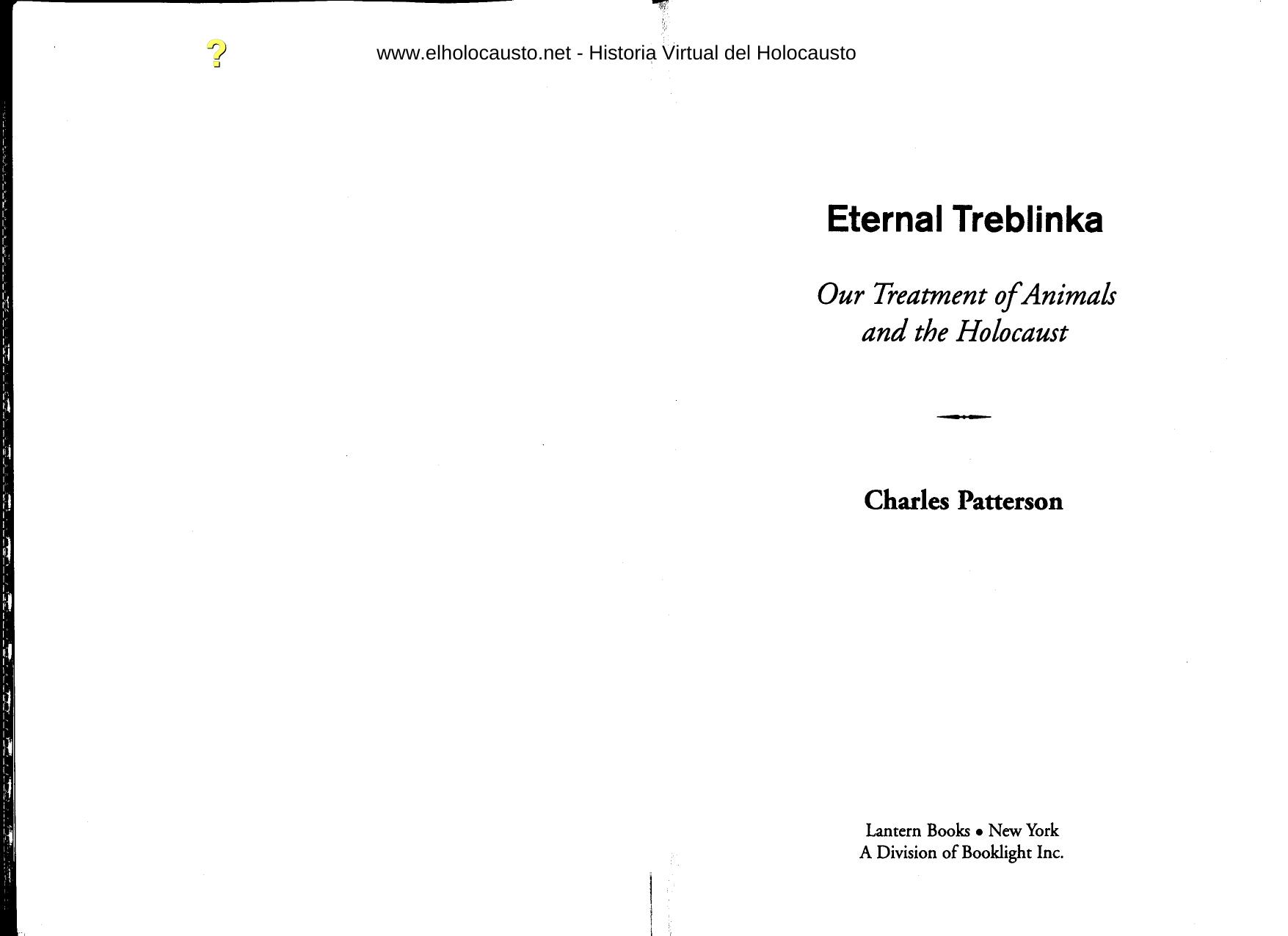Eternal Treblinka: Our Treatment of Animals and the Holocaust by Charles Patterson

Author:Charles Patterson [Patterson, Charles]
Language: eng
Format: epub, pdf
Tags: General, Pets
ISBN: 9781930051997
Google: zkvY1-t3VxMC
Publisher: Lantern Books
Published: 2002-11-15T00:34:06.864550+00:00
THIS BOUNDLESS SLAUGHTERHOUSE
The Compassionate Vision of Isaac Bashevis Singer
O ne of the most powerful pro-animal voices of the twentieth century was the Yiddish writer Isaac Bashevis Singer (1904â91), winner of the Nobel Prize in Literature in 1978.1 Although Singer survived the Holocaust by following his older brother Joshua to the United States in 1935, his mother, younger brother, and many members of his extended family who remained in Poland were killed. Although Singerâs later stories and novels set in America are mostly about Holocaust survivors and refugees from Europe, he did not write about the Holocaust directly. Nonetheless, it was the ever present lens through which he viewed the world, especially when it came to the exploitation and slaughter of animals, which upset him greatly.
The Eleventh Commandment
Singer was born in the small Polish village of Leoncin where his father was a Hasidic rabbi. Although he only lived there until the age of three, Singer remembered that their house had very little furniture, but many books. He also remembered the animals. âEvery week there was a market, and many peasants would come to the town bringing livestock. Once I saw a peasant beating a pig. Maybe it had been squealing. I ran in to my mother to tell her the pig was crying and the man was beating it with a stick. I remember this very vividly. Even then I was thinking like a vegetarian.â2
169 After the family moved to Warsaw where his father served as a rabbi in a poor Jewish neighborhood, Singer took to catching flies and removing their wings. He would then place the wingless fly in a match box with a drop of water and a grain of sugar for nourishment. He did this until he finally realized he was committing âterrible crimes against those creatures just because I was bigger than they, stronger, and defter.â This realization bothered him so much that for a long time he thought about little else. After he prayed for forgiveness and took âa holy oath never again to catch flies,â his thinking about the suffering of flies âexpanded to include all people, all animals, all lands, all times.â3
His experience catching flies appears in his autobiographical novel, Shosha, which is set in Warsaw.4 When the narrator and Shosha pass the street where they both grew up, Shosha tells him, âYou stood on the balcony and caught flies.â The narrator tells her not to remind him. When Shosha asks him why not, he tells her what becomes a constant refrain throughout Singerâs writings: âBecause we do to Godâs creatures what the Nazis did to us.â5
Another of Singerâs early memories is of Yanashâs market in Warsaw where people brought chickens, ducks, and geese to be slaughtered. âThe butchers began to pluck their feathers even while those creatures were still alive and wallowing in their own blood.â6 The scenes of slaughter Singer witnessed there made a deep and lasting impression on him. The Family Moskat, the first novel he wrote after he came to
Download
Eternal Treblinka: Our Treatment of Animals and the Holocaust by Charles Patterson.pdf
This site does not store any files on its server. We only index and link to content provided by other sites. Please contact the content providers to delete copyright contents if any and email us, we'll remove relevant links or contents immediately.
How to Be a Bawse: A Guide to Conquering Life by Lilly Singh(7486)
Spare by Prince Harry The Duke of Sussex(5197)
Millionaire: The Philanderer, Gambler, and Duelist Who Invented Modern Finance by Janet Gleeson(4478)
Machine Learning at Scale with H2O by Gregory Keys | David Whiting(4313)
Never by Ken Follett(3957)
Harry Potter 02 & The Chamber Of Secrets (Illustrated) by J.K. Rowling(3677)
The Heroin Diaries by Nikki Sixx(3550)
Urban Outlaw by Magnus Walker(3400)
Fairy Tale by Stephen King(3399)
Harry Potter and the Prisoner of Azkaban (Book 3) by J. K. Rowling(3360)
Japanese Design by Patricia J. Graham(3178)
The Man Who Died Twice by Richard Osman(3080)
The Club by A.L. Brooks(2926)
Will by Will Smith(2920)
Stacked Decks by The Rotenberg Collection(2883)
Harry Potter and the Deathly Hallows (7) by J.K. Rowling(2725)
Churchill by Paul Johnson(2587)
The Chimp Paradox by Peters Dr Steve(2386)
Borders by unknow(2315)
